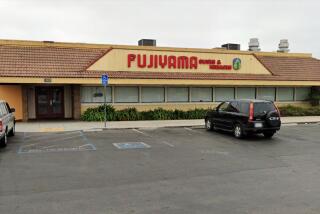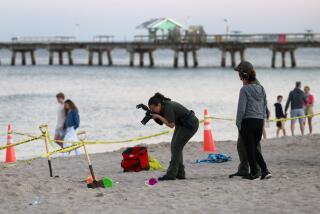Ideas for Safekeeping
- Share via
The empty bottle of Dramamine was in 3-year-old Melanie’s hand, the cherry-flavored motion sickness medicine smeared all over her mouth and shirt.
“I not feeling well,” she complained.
It had all happened in a moment. While her dad was busy unloading the minivan, Melanie managed to open the glove compartment, untwist the child-resistant cap on the bottle and guzzle the pink syrupy stuff that had been stashed there--forgotten since our last big car trip. Of course she’d been told time and time again never to take medicine herself. Of course, I shouldn’t have left it in the car.
We were just lucky it wasn’t a more toxic drug. Still, Melanie and I had to spend the afternoon in the emergency room and the night in the hospital’s pediatric unit where she slept off the drug while being monitored to make sure her heartbeat and breathing didn’t go haywire from the overdose.
The next day, Melanie was back to her noisy, energetic self: She went straight from the hospital to her sister’s Little League game. I needed longer to recover.
The ordeal and a late-night chat with the hospital nurses made me realize how close we might have come to a real tragedy. Each year nearly 8,000 children die in the United States from unintentional injury--more than from all childhood diseases combined--according to the National Safe Kids Campaign, a nonprofit childhood injury prevention program sponsored by the medical supplies manufacturer Johnson & Johnson.
Every day more than 35,000 children are injured seriously enough to require medical treatment for various injuries including car and bike accidents, burns, near drownings and poisonings. Like Melanie, 360,000 are hurt seriously enough to be admitted. Another 50,000 are permanently disabled.
Summer is prime injury season. At this time of year we tend to let down our guard, heading outdoors to playgrounds and pools, and on vacation to beaches and the homes of friends and relatives. But we need to be extra vigilant. More children are fatally injured during the summer than at any other time of year, according to the National Safe Kids Campaign.
“Whenever people make changes from their usual routines--doing something different or being in a different place--it increases the likelihood of accidental injury,” said Dr. Mark Widome, a pediatrician, Pennsylvania State University medical school professor and safety spokesman for the American Academy of Pediatrics. “The most important thing parents can do is plan ahead,” he said. For example, take a bottle of syrup of Ipecac along on all trips, in case a child eats something poisonous or takes someone else’s medicine, as Melanie did. But don’t use it unless directed to by a doctor or poison control center expert.
If the kids are small, ask the car rental agency to provide a child safety seat. Check to see if the hotel you are staying in offers child-proofed rooms or amenities, such as bed railings or outlet covers. A growing number do, including some Embassy Suites and Hyatt properties. Ask about other special features for families. Westin Hotels, for example, just began offering families, on request, free safety kits complete with children’s ID bracelets and emergency phone numbers.
One tip from Safe Kids Campaign associate director Kathryn Kincaid: Keep hotel bathrooms off-limits (as much as possible) to cruising toddlers and preschoolers to separate them from Dad’s razor and Mom’s allergy pills.
Kincaid also suggests that parents discuss safety concerns before arriving for a stay at Grandma’s or with a friend.
Ask that the hosts move household chemicals, plants, ashtrays and medicines to out-of-reach spots. Too many toddlers have landed in the emergency room after eating grandma’s blood pressure pills.
Don’t neglect the older kids. No matter how much they beg, never let them swim alone. Insist on bike helmets. Make sure they know how to get out of the hotel or house in case of fire. Be more circumspect too, when giving them the run of the hotel or unfamiliar neighborhood. They may get lost or not be sufficiently careful crossing unfamiliar streets. And make sure they have the phone number of the place where the family is staying.
“They don’t have a lot of common sense,” said Chicago pediatrician Diane Holmes, herself the mother of three. “They might find themselves in situations they can’t handle.”
More to Read
Sign up for Essential California
The most important California stories and recommendations in your inbox every morning.
You may occasionally receive promotional content from the Los Angeles Times.













